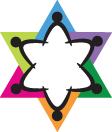I really appreciate Josh Feigelson’s distinction between Big Questions and Hard Questions. I think it is so rich and helpful, and can provide us with a roadmap to more effective Peoplehood education. As he says so eloquently “If we are to renew a sense of peoplehood, we have to renew a language and ethic of responsibility. And doing that starts with asking bigger questions—not the Hard Questions of labeling and categorization, but the Big Questions that animate all our lives and the tradition to which we are heirs.”
So, what ARE the Big Questions that are most applicable to Jewish Peoplehood education? I would suggest that the Big Questions that work best for Peoplehood education are focused around notions of belonging. After all, Peoplehood is essentially a connection to a group beyond ones own immediate family on the basis of something shared (a history, culture, language etc.,). So when we focus on strengthening that connection, we necessarily have to explore what it means to be connected to that group, and on what basis we belong to it. And that leads us to conversations about belonging, which is a universal human need, something that everyone can relate to, and that everyone has an experience of. Thus, we arrive at a series of Big Questions, including:
- What does belonging mean to you?
- What (or who) do you belong to?
- When and how do you experience a sense of belonging?
And because a sense of belonging is often expressed in a commitment or responsibility to someone, or to a group, there is the related question:
- For whom do you feel responsible?
Using these questions as the basis for Peoplehood education can help strengthen engagement with, commitment to and ultimately action on behalf of the Jewish People.
What other Big Questions would you suggest?








